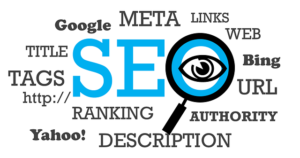Introduction:
In today’s digital landscape, having a strong online presence is no longer optional but essential. SEO offers small businesses a chance to boost online visibility, attract more customers, and compete effectively with larger corporations. By focusing on SEO, smaller enterprises can establish a strong digital presence, reach a wider audience, and drive growth in a competitive market. With the right strategies, you can improve your online visibility, attract your target audience, and drive sustainable growth. In this blog post, we’ll explore how small businesses can make a big impact using SEO.

Understanding the Basics of SEO for Small Businesses:
SEO, also called Search Engine Optimization, is crucial in boosting a website’s visibility and ranking on Search Engine Results Pages (SERPs). SEO aims to enhance organic traffic and expand brand exposure to potential customers by strategically refining content, meta tags, and user experience. By aligning website elements with search engine algorithms, businesses can effectively reach their target audience and improve online presence.

Why is SEO important for small businesses?
- Increased online visibility: SEO helps small businesses reach a larger audience and increase their online presence.
- Targeted traffic: SEO attracts relevant traffic to your website, increasing the chances of converting visitors into customers.
- Cost-effective: SEO is a long-term strategy that can produce sustainable results, reducing reliance on paid advertising.
- Competitive advantage: Optimizing your website for search engines can help you outrank competitors and establish your business as an industry leader.
Keyword Research: The Foundation of SEO for Small Businesses
Keyword research is the main foundation of any successful SEO strategy. By identifying the keywords and phrases your target audience is searching for, you can create content that meets their needs and ranks well in search engines. Use trusted tools like Google Keyword Planner, Ahrefs, or SEMrush to find keywords that balance search volume and competition. Strategically boosting SEO and enhancing visibility is the key to expanding your reach and attracting a broader audience. By implementing effective SEO techniques, you can drive organic traffic to your website, ultimately increasing your online presence and engagement with potential customers.
On-Page SEO: Optimizing Your Website Content
On-page SEO refers to the elements you control on your website. This includes refining title tags, meta descriptions, headings, and the content body to improve its overall structure and optimise the search engine. Ensure your primary keywords are naturally integrated into your content, and use internal linking to guide visitors to related pages on your site. Always aim for high-quality, informative content that provides value to your audience.
Off-Page SEO: Building Authority Outside Your Website
Off-page SEO boosts your site’s reputation and authority by earning backlinks from other reputable websites. Guest posting, social media engagement, and creating shareable content effectively earn these valuable links. Each backlink acts as a vote of confidence from other sites, signalling to search engines that your site is trustworthy and authoritative.
Local SEO: Focusing on Your Community
For small businesses, local SEO is crucial. Boost your online visibility by claiming and optimizing your Google My Business profile! Ensure accuracy and consistency by verifying that your business’s Name, Address, and Phone Number (NAP) match across all online directories, including Google My Business, Yelp, and other local listings. Incorporate local keywords into your content and encourage satisfied customers to leave positive reviews. Local SEO helps you connect with customers in your geographic area, driving foot traffic and local engagement.

Measuring Success: Key SEO Metrics to Track
It’s important to track the effectiveness of your SEO efforts. Monitor metrics such as organic traffic, bounce rate, and conversion rates using tools like Google Analytics and Google Search Console. Pay attention to keyword rankings, the number of backlinks, and your site’s overall visibility in search results. These Metrics provide insights into strengths and areas for improvement. Analyze them to inform decisions, shape strategies, and boost performance effectively.
SEO Tools and Resources:
Several tools and resources can aid in your SEO journey. Google Analytics and Google Search Console are essential for tracking site performance. Tools like Moz, Ahrefs, and SEMrush offer comprehensive data on your SEO metrics, helping you make informed decisions. Stay updated with leading SEO blogs such as Moz, Search Engine Land, and Neil Patel for the latest tips and trends.
Conclusion: Start Your SEO Journey Today
SEO is a powerful tool for small businesses, offering a path to increased visibility and growth. By understanding and implementing the strategies discussed, such as keyword research, on-page and off-page SEO, and local SEO, you can significantly elevate your online presence. Remember, SEO is a long-term investment, but the rewards are worth the effort. Begin your SEO journey today and watch your small business thrive in the digital world.
